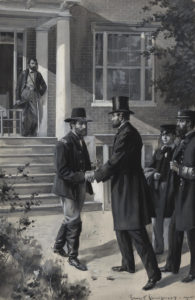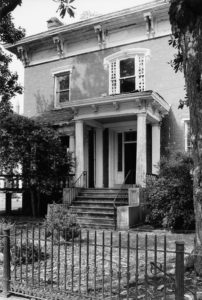Momentous events in American history occurred in late March and early April 1865 in and around Petersburg, Virginia. The defeat of Major General George E. Pickett’s Confederate force at the Battle of Five Forks on April 1, 1865, opened the way for Union forces to finally sever the South Side Railroad to the west of Petersburg on the following day. The Union Army commander, Lieutenant General Ulysses S. Grant, ordered a general assault by Union forces around Petersburg to begin at daybreak on April 2. Major General Horatio G. Wright’s VI corps penetrated Confederate lines at what is now Pamplin Historical Park early that morning. After hearing of the breakthrough, Grant moved his headquarters to the vicinity of the Banks House, also now a part of Pamplin Historical Park. Soon thereafter, he sent a message to Major General George S. Meade stating that his headquarters would be at the Banks House. It is believed that Grant spent the night of April 2 in or near the house. Early on the morning of April 3, Grant invited president Abraham Lincoln to meet with him in Petersburg that day. Lincoln was on a visit to the front and that morning was just east of Petersburg at City Point (now Hopewell). Grant likely departed from the Banks House to meet Lincoln.
The location for the meeting was the Thomas Wallace House at the southwest corner of Brown and South Market Streets. The current address for this house is 204 South Market Street. Meade and his aide-de-camp, Lieutenant Colonel Theodore Lyman, entered Petersburg early on the morning of April 3. Lyman recorded, “as we got to the heart of the place [Petersburg] we came on Market Street where dwell the haute noblesse; a street for all the world like one in Salem, with the same good, square, brick houses and trees about them.” They came by “the handsome house of Mr. Wallace,” where Grant and his staff were located. Grant and Meade learned while at the Wallace House about the death of Confederate Lieutenant General A.P. Hill in the fighting early on the morning of April 2. Meade departed the Wallace House before Lincoln arrived.
The owner of the house, Thomas Wallace, was a 52-year-old attorney, former member of the Virginia House Of Delegates and the U.S. House Of Representatives, and was the president of the Petersburg branch of the Exchange Bank of Virginia. When the Commonwealth of Virginia called for a state convention to discuss Virginia’s relation to the Confederate States on February 13, 1861, the cities and counties around the state voted to see who would represent them at the convention. Petersburg chose between Thomas Branch, a successful businessman, who was pro-Union, and Wallace, who wanted Virginia to join the Confederacy. On February 4, 1861, an “overwhelming” majority voted for the Unionist Branch as Petersburg’s representative to the state convention. This vote demonstrated the strong sentiment among Petersburg voters, over two months before the bombardment of Fort Sumter, to remain in the Union.
Lincoln left City Point by rail at 9 am on April 3. In his party were his young son, Tad, his bodyguard, William Crook, Admiral David Dixon Porter, and Navy Captain John S. Barnes. Lincoln’s eldest son, Captain Robert Lincoln, met his father on behalf of Grant at Hancock Station on the United States military railroad just west of the Jerusalem Plank Road (now Crater Road). Captain Lincoln was on Grant’s staff, and the general sent a small cavalry escort and provided his horse “Cincinnati” for the president to ride. En route, Lincoln viewed numerous Confederate dead in rebel earthworks, and Crook noted that his face became sad.
At approximately 11 am, Lincoln arrived at the Wallace House, and Grant and his staff met the president inside the front gate. The president heartily shook Grant’s hand and thanked him profusely. Lincoln then told Grant, “Do you know, general, that I have had a sort of a sneaking idea for some days that you intended to do something like this.” When Wallace’s son saw Lincoln approaching the house, he said to his father, “you are not going to let that man come into the house!” Wallace replied, “ I think it would not do to try to stop a man from coming in who has 50 thousand men at his back!” When Lincoln saw Wallace, he greeted him cordially, remarking on their former days together as members of the Whig Party in the U.S. House Of Representatives. Wallace quoted his son’s comment, and Lincoln seemed bemused. The president then asked if he and Grant could sit on his piazza for a few minutes. Wallace invited Lincoln and Grant inside, but Grant declined since he was smoking a cigar. His smoking habit would end his life twenty years later.
During their conversation, Grant informed Lincoln that he intended to have the armies in the east (the Army of the Potomac and the Army of the James) defeat and capture Lee’s army; he did not intend to involve Major General William T. Sherman’s western army. Grant wrote in his memoirs, “Western members might be throwing it up to the members of the east that in the suppression of the rebellion they were not able to capture an army, or to accomplish much in the way of contributing toward that end, but had to wait until the western armies had conquered all the territory south and west of them, and then come on to help them capture the only army they had been engaged with.” The president responded that he had never thought of that. Lincoln spent about thirty minutes talking about his thoughts on reconstruction and his desire for a lenient policy toward the south. Their meeting lasted about ninety minutes.
The next twelve days were among the most significant in the history of the United States. Grant departed Petersburg and headed west to catch up with and defeat Lee’s army. Six days after the meeting with the president at the Wallace House, Grant received Lee’s surrender at Appomattox Court House, which effectively ended the Civil War. On the day after meeting with Grant, President Lincoln walked through the streets of Richmond, the Confederate capital. A few days hence, he returned to Washington, only to be struck down by an assassin on April 14 while attending a play at Ford’s Theater. On April 15, Andrew Johnson was sworn in as the 17th president. The early years of Reconstruction would be his responsibility.

